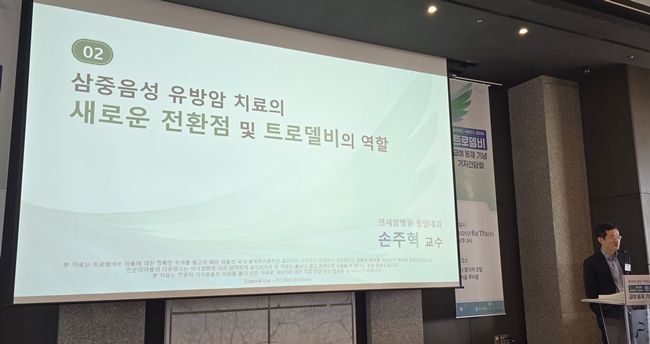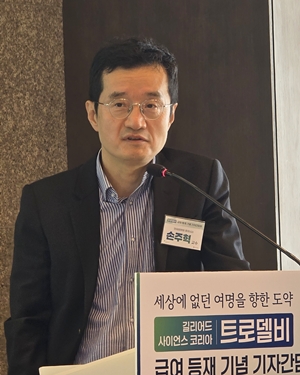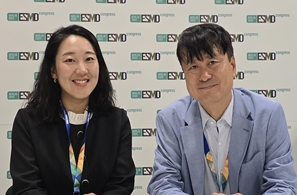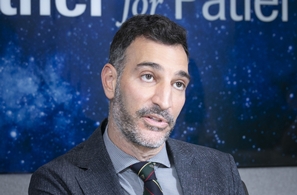- Trodelvy approved for reimbursement with the ICER value
- by Whang, byung-woo | translator Hong, Ji Yeon | Jun 12, 2025 06:06am
Experts assess that the metastatic TNBC treatment, which has been challenging due to a high risk of metastasis and relapse and relied on chemotherapy, has undergone a transition.
There is a high demand for Trodelvy, as demonstrated by two previous National Petitions with over 50,000. In the future, the survival benefit is expected to rise.

On June 11, Gilead Sciences Korea hosted a session to celebrate reimbursement approval of Trodelvy, and the company shared the latest updates on TNBC treatment and the significance of reimbursement.
TNBC is a type of breast cancer that is negative for three receptors: two types of hormone receptors and the HER2 receptor. TNBC has unmet needs because there is no receptor that treatment can target, and treatment options have been limited to cytotoxic anticancer agents.
Trodelvy is known to bind Trop-2 protein, releasing the medicine inside tumor cells. It minimally affects healthy cells, and it can destroy not only tumor cells but also the tumor microenvironment (TME).
Besides cytotoxic anticancer agents, Trodelvy is the only treatment approved by the Ministry of Food and Drug Safety (MFDS) as a second-line treatment for patients with metastatic TNBC, regardless of existing genetic mutations or biomarkers.
When MFDS granted approval in May 2023, Trodelvy presented a cost burden of KRW 10 million per cycle. It was approved for national health insurance reimbursement in June, thereby expanding patient accessibility.
Specifically, Trodelvy can be reimbursed for treating locally advanced or metastatic TNBC as a third-line or later treatment. If recurrence occurs during or within one year of completing neoadjuvant or adjuvant chemotherapy, previous treatments are considered as first-line treatment, allowing for reimbursement of Trodelvy in the second-line setting as well.
Trodelvy was categorized as having innovativeness. It gained attention for becoming the first case to clear the DREC review, with its price being measured based on its an Incremental Cost-Effectiveness Ratio (ICER) values.
Dr. Joohyuk Sohn, a Professor at Yonsei Cancer Hospital's Department of Oncology, who presented during the meeting, assessed that reimbursement approval of Trodelvy will bring a new shift in the treatment of TNBC.

Additionally, Trodelvy, with efficacy confirmed through the Phase 3 ASCENT study and now reimbursed, is considered a potential new game changer.
Dr. Sohn stated, "The final analysis results of the ASCENT study showed that the overall survival (OS) of the Trodelvy treatment group, including patients with brain metastases, was 11.8 months, approximately twice as long as the single-agent chemotherapy group (6.9 months), and it reduced the risk of death by 49%."
The breast cancer guidelines of the National Comprehensive Cancer Network (NCCN) and the European Society for Medical Oncology (ESMO) foremost recommend Trodelvy as a second-line treatment for metastatic triple-negative breast cancer.
Dr. Sohn emphasized, "For patients who were hesitant to receive treatment because Trodevly was not reimbursable, despite the clear clinically confirmed treatment benefits, the reimbursement listing of Trodelvy will bring survival benefits."
"When new drug efficacy is proven, rapid reimbursement approval is needed to expand patient access"
In particular, Dr. Sohn suggested that if a new drug's efficacy is sufficient, a rapid reimbursement approval is necessary.
Dr. Sohn stressed, "Regarding (new drug) accessibility, it takes too long, usually 3 to 4 years, and I think it's problematic that we consider it a good thing when it takes only 2 years," and added, "While reimbursement listings can be delayed due to health insurance finances. If the research data is not accurate, it can also be delayed. However, if the benefit in OS is proven, rapidly expanded reimbursement is necessary."
Meanwhile, Trodelvy is recently expected to expand its indication as a first-line treatment for TNBC through combination therapy with the immunotherapy Keytruda.
In the interim analysis results of the Phase 3 'ASCENT-04/KEYNOTE-D19' clinical trial, presented at the recent American Society of Clinical Oncology (ASCO 2025) Annual Meeting, the median progression-free survival (mPFS) for the Keytruda-Trodelvy group was 11.2 months, showing a significant improvement over the control group's chemotherapy+Keytruda at 7.8 months.
The duration of response (DOR) for the Trodelvy-Keytruda treatment group was 16.5 months, while chemotherapy+Keytruda was limited to 9.2 months. The OS data were yet incomplete, but a positive trend was observed with Trodelvy plus Keytruda.
-

- 0
댓글 운영방식은
댓글은 실명게재와 익명게재 방식이 있으며, 실명은 이름과 아이디가 노출됩니다. 익명은 필명으로 등록 가능하며, 대댓글은 익명으로 등록 가능합니다.
댓글 노출방식은
댓글 명예자문위원(팜-코니언-필기모양 아이콘)으로 위촉된 데일리팜 회원의 댓글은 ‘게시판형 보기’와 ’펼쳐보기형’ 리스트에서 항상 최상단에 노출됩니다. 새로운 댓글을 올리는 일반회원은 ‘게시판형’과 ‘펼쳐보기형’ 모두 팜코니언 회원이 쓴 댓글의 하단에 실시간 노출됩니다.
댓글의 삭제 기준은
다음의 경우 사전 통보없이 삭제하고 아이디 이용정지 또는 영구 가입제한이 될 수도 있습니다.
-
저작권·인격권 등 타인의 권리를 침해하는 경우
상용 프로그램의 등록과 게재, 배포를 안내하는 게시물
타인 또는 제3자의 저작권 및 기타 권리를 침해한 내용을 담은 게시물
-
근거 없는 비방·명예를 훼손하는 게시물
특정 이용자 및 개인에 대한 인신 공격적인 내용의 글 및 직접적인 욕설이 사용된 경우
특정 지역 및 종교간의 감정대립을 조장하는 내용
사실 확인이 안된 소문을 유포 시키는 경우
욕설과 비어, 속어를 담은 내용
정당법 및 공직선거법, 관계 법령에 저촉되는 경우(선관위 요청 시 즉시 삭제)
특정 지역이나 단체를 비하하는 경우
특정인의 명예를 훼손하여 해당인이 삭제를 요청하는 경우
특정인의 개인정보(주민등록번호, 전화, 상세주소 등)를 무단으로 게시하는 경우
타인의 ID 혹은 닉네임을 도용하는 경우
-
게시판 특성상 제한되는 내용
서비스 주제와 맞지 않는 내용의 글을 게재한 경우
동일 내용의 연속 게재 및 여러 기사에 중복 게재한 경우
부분적으로 변경하여 반복 게재하는 경우도 포함
제목과 관련 없는 내용의 게시물, 제목과 본문이 무관한 경우
돈벌기 및 직·간접 상업적 목적의 내용이 포함된 게시물
게시물 읽기 유도 등을 위해 내용과 무관한 제목을 사용한 경우
-
수사기관 등의 공식적인 요청이 있는 경우
-
기타사항
각 서비스의 필요성에 따라 미리 공지한 경우
기타 법률에 저촉되는 정보 게재를 목적으로 할 경우
기타 원만한 운영을 위해 운영자가 필요하다고 판단되는 내용
-
사실 관계 확인 후 삭제
저작권자로부터 허락받지 않은 내용을 무단 게재, 복제, 배포하는 경우
타인의 초상권을 침해하거나 개인정보를 유출하는 경우
당사에 제공한 이용자의 정보가 허위인 경우 (타인의 ID, 비밀번호 도용 등)
※이상의 내용중 일부 사항에 적용될 경우 이용약관 및 관련 법률에 의해 제재를 받으실 수도 있으며, 민·형사상 처벌을 받을 수도 있습니다.
※위에 명시되지 않은 내용이더라도 불법적인 내용으로 판단되거나 데일리팜 서비스에 바람직하지 않다고 판단되는 경우는 선 조치 이후 본 관리 기준을 수정 공시하겠습니다.
※기타 문의 사항은 데일리팜 운영자에게 연락주십시오. 메일 주소는 dailypharm@dailypharm.com입니다.
- [Op-Ed] Patients, no time left for 'new drug comb therapies'
- Special Contribution | Eo, Yun-Ho









